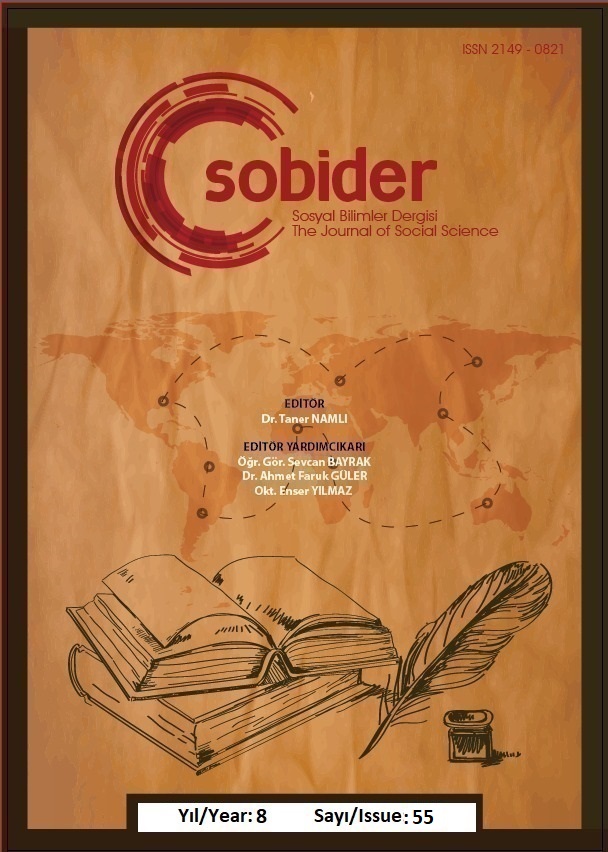Author :
Abstract
Kodlanmış kortikal bağlantıların ötesinde belleğin toplumla ve bireyle münasebeti, bunların karşılıklı etkileşimi ve çatışkısı sosyoloji gibi edebiyatın da gündemini meşgul etmiştir. Kurmaca yardımıyla tarihsel bir dönemecin okunma anına çekilmesi, okuma esnasında bir tamamlananın canlanması, estetik aktarıma rağmen bir hatırla(t)ma rejimi hedeflemektedir. Hayatta kalanların söylem ve anlatıları, anılarının nasıl korunduğu veya silindiği, travma ve yasın kolektif sağaltımı; kurgunun yörüngesini belirlemektedir. Belleğin edebi türlerin vasıtasıyla işlemesi, kuşak bağıntısının otobiyografi, anı, mektup, günce üzerinden sağlanması, ortak beyan ve sembollerin irdelenebileceği bir alan olarak anımsama edebiyatının belirleyiciliğini ortaya koymaktadır. Bu çalışmada modern Yunan edebiyatının gazeteci yazarı Dido Sotiriyu’dan ödünç aldığımız “bellek- anlatı” terimiyle 1982 yayın tarihli tek postmodern romanı Katedafizometa’da bellek- anlatıyı nasıl kurduğunu incelemeye girişeceğiz. Eserin yakın okumasıyla Aris Yannulis’in notlarını esas alacak, karmaşık bir yapıya ve katmanlı bir biçeme sahip romanın aktarım kanallarını tespit etmeye çalışacağız.
Keywords
Abstract
Beyond the coded cortical connections, the relationship of memory with society and the individual, and their mutual interaction and conflict have occupied the agenda of literature as well as that of sociology. Drawing a historical turning point into the moment of reading by means of fiction, and bringing it back to life during reading aim to remind or remember this historical moment despite the aesthetic transfer. Discourses and narratives of survivors, how their memories are preserved or erased as well as collective healing of trauma and grief all combine to determine the trajectory of the fiction. The fact that the memory works through literary genres, and that the generational connection is provided through autobiography, memoir, letter and diary reveal the importance of the literature of reminiscence as a field where common statements and symbols can be examined. In this study, we will attempt to examine how modern Greek literature constructs memory-narrative in Katedafisometa, the only postmodern novel published in 1982, with the term "memory-narrative" borrowed from its journalist writer Dido Sotiriou. Basing ourselves on Aris Yannoulis’s notes and carrying out a close reading of the work, we will try to determine the transmission channels of the novel, which has a complex structure and layered style.
Keywords
- Assmann, Jan (2014) Kültürel Bellek. çev. Ayşe Tekin İstanbul: Ayrıntı.
- Avishai, Margalit (2004) The Ethics of Memory. United States of America: Harward University.
- Bell, Duncan (2006) Memory, Trauma and World Politics: Reflections on the Relationship Between Past and Present. London: Palgrave.
- Bertaux, Daniel; Thompson Paul (2005) Between Generations. London: Routledge.
- Booth, W.J. (2006) Communities of Memory: On Witness, Identity and Justice. Ithaca: Cornell University.
- Butler, Judith (2016) Kırılgan Hayat: Yasın ve Şiddetin Gücü. çev. Başak Ertür İstanbul: Metis.
- Connerton, Paul (2014) Toplumlar Nasıl Anımsar. çev. Alaaddin Şenel İstanbul: Ayrıntı.
- Close, David H. (1995) The Origins of the Greek Civil War. London: Longman Group Limited 1995.
- Corning, Amy; Howard Schuman (2014) Generations and Collective Memory. Chicago: University of Chicago.
- Durkheim, Emile (2019) Sosyolojik Yöntemin Kuralları. çev. Özcan Doğan Ankara: Doğu Batı.
- Eyerman, Ron (2001) Cultural Trauma. Cambridge: Cambridge University.
- Felman, Shoshana; Laub, Dori (2014) Testimony: Crises of Witnessing in Literature, Psychoanalysis and History. London: Routledge.
- Fentress, James; Wickham, Chris (1992) Social Memory. Oxford: Blackwell.
- Hirsch, Marianne (1997) Family Frames: Photography, Narrative and Postmemory. Cambridge: Harvard University.
- Ricoeur, Paul (2017) Hafıza, Tarih, Unutuş. çev. M. Emin Özcan İstanbul: Metis Yayınları, 2017.
- Halbwachs, Maurice (2016) Hafızanın Toplumsal Çerçeveleri. çev. Büşra Uçar Ankara: Heretik Yayınları, 2016.
- Landheer, Bart (1952) Mind and Society: Epistemological Essays in Sociology. Lahey: 1952.
- Misztal, Barbara (2003) Theories of Social Remembering. Maidenhead Philadelphia: Open
- Nalbantian, Suzanne (2003) Memory in Literature. London: Palgrave Macmillan.
- Nichanian, Marc (2018) Edebiyat ve Felâket. çev. Ayşegül Sönmezay. İstanbul: İletişim.
- Schacter, Daniel (2001) The Seven Sins of Memory: How the Mind Forgets and Remembers.
- Sarlo, Beatriz (2012) Geçmiş Zaman, Bellek Kültürü ve Özneye Dönüş Üzerine Bir Tartışma. çev. P. Beyaz Charum ve Deniz Ekinci İstanbul: Metis.
- Simmel, Georg (2009) Bireysellik ve Kültür. çev. Tuncay Birkan İstanbul: Metis.
- Sontag, Susan (2004) Regarding the Pain of Others. USA: Macmillan.
- Sotiriyu, Dido (2008) Matomena Homata. Atina: Kedros.
- Sotiriyu Dido (2008) Anaskafes. Atina: Kedros.
- Sotiriyu, Dido (2011) Episkeptes. Atina: Kedros.
- Sotiriyu, Dido (2012) Ta Pedia tu Spartaku. Atina: Kedros.
- Sotiriyu, Dido (2014) Endoli. Atina: Kedros.
- Sotiriyu, Dido (2015) İlektra. Atina: Kedros.
- Sotiriyu, Dido (2016) Mesa Stis Floğes. Atina: Kedros.
- Sotiriyu Dido (2017) İ Nekri Perimenun. Atina: Kedros.
- Sotiriyu Dido (2019) Katedafizometa. Atina: Kedros.
- Sotiriyu, Dido (2019) İroes ke Andiiroes. Atina: Kedros.
- Suleiman, Susan (2006) Authoritarian Fictions. The Ideological Novel as a Literary Genre. New Jersey: Princeton University.
- Tonkin, Elizabeth (1992) Narrating our Pasts: The Social Construction of Oral History. United Kingdom: Cambridge University.
- Traverso, Enzo (2019) Geçmişi Kullanma Kılavuzu. çev. Işık Ergüden İstanbul: İletişim.
- Zarecka, Iwona (2007) Frames of Remembrance: The Dynamics of Collective Memory. London: Routledge.
- Zerubavel, Eviatar (2003) Time Maps: Collective Memory and the Social Shape of the Past. Chicago: University of Chicago Press.
- Wertsch, James V. (2010) Voices of Collective Remembering. Cambridge University.
